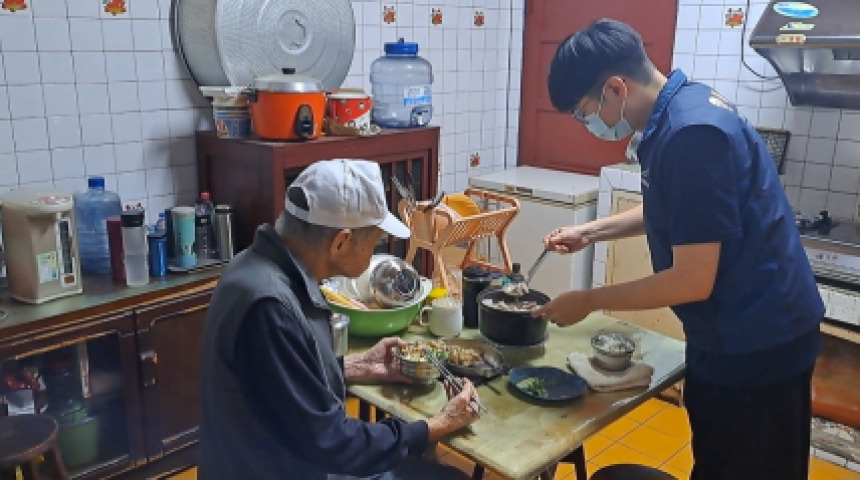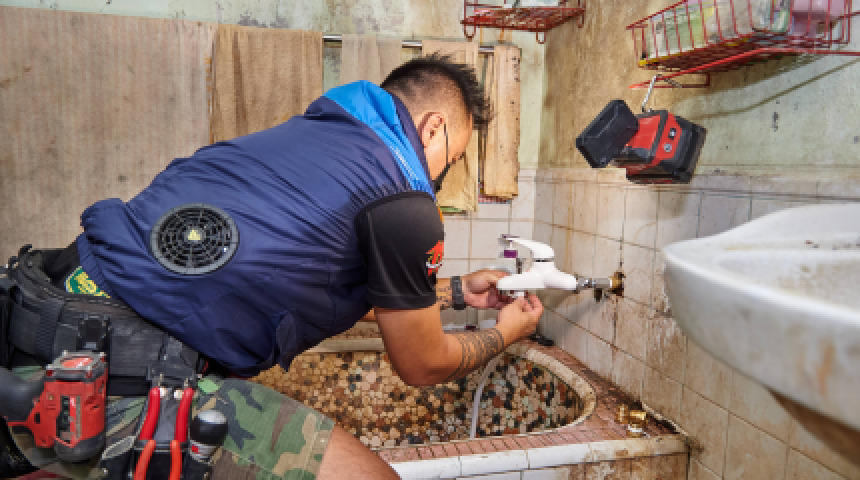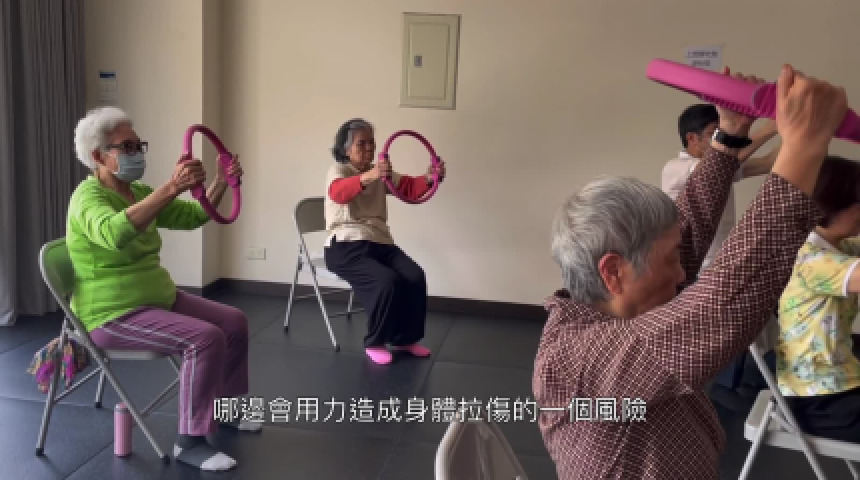陪你到最後
Subtitles:
Five o’clock in the early morning, the sun had barely risen. The sky outside is dingy and overcast.
But while most people are still in their beds, in Nanhua County—a small village on the outskirts of Tainan City, a home care attendant is already dressed and prepared to start her working day.
(Mrs. Lee: Okay, let’s go buy breakfast!)
Mrs. Lee, a 56-year-old home care attendant, has been working in home care for almost five years. She lives in Nanhua but needs to travel back and forth between Nanhua and neighboring county Yujin several times a day to visit her clients, typically vulnerable adults aged 70 and above. Thus, she spends a great part of her daytime in the driver’s seat of a speeding car.
At five thirty sharp, we arrive at our first stop, Ooshan--- a remote village located atop a mountain crag. The Chens are an elderly couple who dwell there. Both of them are in their eighties. Mrs. Chen has arthritis and Mr. Chen suffers from Alzheimer’s. All of their children are working in the city, so it is up to Mrs. Lee to bring them meals every day.
(Mrs. Chen: Our children come and visit us on Sundays. All of our daughters are married…)
In recent years, the number of people over 65 has increased dramatically in Taiwan, and the impact of population aging is particularly profound in rural areas, where many senior citizens find themselves in similar predicaments as the Chens. Some have succumbed to mental disorders or other chronic illness while others are paralyzed. They are no longer capable of managing daily tasks, and must depend on other people’s assistance, even with simple activities such as eating, taking a bath, changing a light bulb or visiting the local clinic.
(Mrs. Lee: He has problems swallowing, so you need to feed him puréed food. Otherwise he may choke.)
This is why home care attendants play such an essential role in Taiwanese society. In Mrs. Lee’s case, she works thirteen hours a day, six days a week, and is in charge of a wide range of tasks--- everything from cooking, nursing, household cleaning, washing, to applying physical therapy.
Mrs. Lee: What these elders need most is company-- Some might need food or other physical supplies, naturally--- but what they really want is someone whom they can talk to.
As you can see, most of these elders live alone. Some have children, but their family members don’t really spend time with them, so there is absolutely nothing for them to do. Those who have trouble walking can only sit at home every day, staring at the television or at the opposite wall.
So after I finish the required tasks, I usually stay a little longer, just to keep them company.
(Mrs. Lee: Ma’am, can I come in through here?)
Mrs. Lee: This is why home care workers in these parts can’t take any days off--- because these elders depend on us. When they are alone at home, we must visit them, even on typhoon days, or else they’ll go hungry.
There has long been a huge shortage in the number of home care attendants. This is not surprising, since domestic work is not regarded as a professional field in Taiwan. The wage of a home care attendant is 170~180NT per hour, distinctly lower than the national average of 258NT per hour. The heavy workload, hazardous environment and prolonged working hours the job entails are also reasons that have kept people away. Most home care attendants do not have a college degree and come from economically disadvantaged backgrounds. 92% of them are women.
(Mrs. Lee: Did you get any sun today?
Mrs. Wang: No, it has been raining all morning. It only just stopped now.)
Mrs. Lee: Love and patience is extremely important in this profession. For me, I’ve always treated these elders like my own parents. Although my parents are both gone, they are just like fathers and mothers to me.
(Mrs. Lee: I think the washing machine might be broken… It’s plugged in…)
Currently, there are over 30,000 job openings in the field nationwide, and as the average lifespan increases, demand for long-term care services continues to rise. But on the other hand, home care attendants suffer from under-payment and overwork.
Clearly, this is a good time to rethink the home care system. Although longevity is a triumph of modern medicine, further procedures must be adopted to ensure that the elderly and their caretakers can lead their lives with dignity.
清晨五點鐘,窗外的天空濛濛亮。
但別以為此時所有人都還沉浸在甜美的夢鄉中。在台南東部的南化小鎮,居家服務員早已起床,並且收拾好物品,準備上工。
家住南化的李大姊從事居家照顧服務已經有四年半,是個經驗豐富的居家服務員。她一天多次來回玉井與南化,有大半的時間是在汽車的駕駛座上度過。
但認真負責的她卻從不抱怨,因為對她來說,這不僅僅是一份工作,更是傳遞一份溫暖。
住在烏山的鄭爺爺與鄭奶奶今年已經高齡八十多歲了。
他們的家人平時在城裡工作,無法長時間照顧兩位老人家,行動不便的鄭奶奶無法獨力照顧失智的鄭爺爺,必須仰賴居家服務員每天上山探視。
近年來,台灣面臨高齡化社會的來臨,偏鄉人口老化的問題日趨嚴重。在偏遠的南化、玉井一帶,還居住著許多和鄭爺爺和鄭奶奶處境類似的老人家。
有一些罹患失智症,有一些則是因為疾病而癱瘓,就連日常的生活起居都無法自理。
居家服務員正是為了因應這種需求所誕生的職業。
舉李大姊為例,她每個禮拜只休假一天,其他日子每天都必須從早工作到晚,無論是擦澡、煮飯、復建、打掃、餵藥,都是她的工作內容。
每個老人家都像是一本萬言書,記錄著歲月的曲折與生命的奇蹟。
對活到九十歲,思緒仍十分清晰的顏爺爺來說,生活中的人事物還是從前的、熟悉的比較好,就像這台陪伴他度過半個世紀的洗衣機。雖然終究會老舊、會有停止轉動的一天,但是所蘊含的意義卻永遠無可取代。
偏鄉的居家服務員十多年來一直處於人員短缺的狀態,而需要照顧的老人家卻逐年增加。如何達到「老有所終」已是台灣社會必須重視的的一項迫切課題。
這關係到的不僅是社會的持續進步,還有生活在這片土地上的每個人在人生的最後一段路上是否能走得平安、快樂、有尊嚴。
公民記者 台南採訪報導





回應文章建議規則: